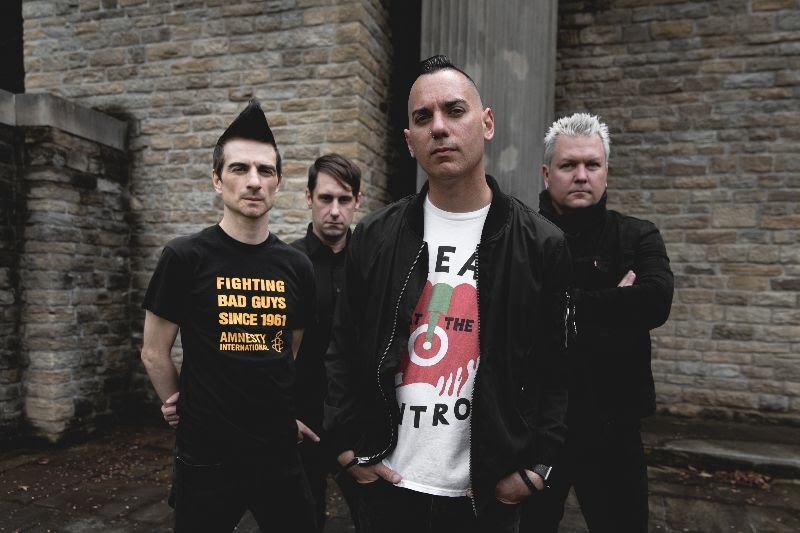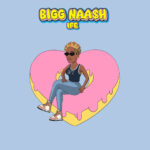Greek Fire recently returned with a new EP — Orientation — following a multi-year break from it all. They last released Lost back in 2014, and life just sort of got in the way for everyone in the band — especially for frontman Phillip “Moon” Sneed, but more on that later.
Nevertheless, following their return, fans were immediately excited. Greek Fire came back with new music right off the bat, and even promised that more music was coming. While Orientation dropped the day of their comeback, they do have plans to release another new EP, Broken, on February 14th, 2019. You can pre-order the new release by heading to their PledgeMusic campaign.
Greek Fire didn’t want to stop there, however, and today we have even more new music for you. Today, we are excited to premiere the band’s cover of “True Colors,” which you most likely know from Cyndi Lauper or Phil Collins — or both. If it seems like an interesting, out of left field song for the band to cover, you’re not alone. This wasn’t their idea, as Sneed mentions to me that during their last PledgeMusic campaign for 2014’s Lost, someone proposed they do this cover as was part of a $100 pledge where Greek Fire would allow fans to pick one song they wanted the band to cover. “Somebody suggested ‘True Colors,’” he begins, “And when I started playing around with it at home, I kinda came up with a vibe for it that was different. Obviously everybody knows the Cyndi Lauper version and the Phil Collins version — both of those are so good, so unique, and paint a completely different picture for the listener. I was like, ‘If that song can be that versatile with just two versions, I wonder if we can make a third that has a totally different vibe.’ At the time, I kind of wanted to make almost a movie soundtrack version of the song and blend the two melody lines — between the Cyndi Lauper version and the Phil Collins version — and sort of throw my own twist on it, but still keep the integrity of both vocal lines.”
When you have your own music that you are putting out, Sneed explains that there is more pressure compared to when you are doing a cover. This was a bit of a surprise to me, having assumed those roles would be flipped. However, he explains it as already knowing that there are two awesome versions out there that exist for “True Colors,” so if people don’t like the version from Greek Fire, then they have those to fall back on. However, when you are working hard on your own music, that is all people will know and you won’t necessarily get a second shot at it.
“If you miss it, you miss it. It goes into the ether and nobody’s missing out on anything because the song does exist in a beautiful form somewhere,” Sneed begins to elaborate on this very idea. “But, if you know you have this great song that would benefit the world inside of you, and you fuck it up, then like, something now doesn’t exist that you know could have existed. At least that’s the pressure of the artist. But if you’re doing a cover or something you already know is in the world and the world is benefiting from and you miss it, well fuck it.”
In addition to premiering this new track for you today, you can check out the rest of our interview with Sneed below. We discuss the return of Greek Fire, the latest EP Orientation, the upcoming release Broken, and much more.
I know you’ve been busy since the last record with Greek Fire, so congrats on the new record. Just to catch up, what have you been personally up to since then?
A lot. We put [Lost] out a few years ago and we did more music right afterwards, and had some music kind of in reservation as well that we were planning on releasing a lot sooner than [Orientation].
But, we ended up doing a record with a band that I was in at the time, Story of the Year, and we also did a Goldfinger record that we had released last summer.
The original plan was to put out a Greek Fire record last year, but it was just too much. We wouldn’t have been able to give it time, energy, or love because of the Goldfinger record coming out in the summer, and then doing a record with [Story of the Year] as well.
It’s been a lot of stuff. I also do a morning show on the alternative station here in St. Louis that’s Monday through Friday, 6am to 10am, it’s called the Rizzuto Show — that takes a lot of time and is a big part of life and career.
It definitely seems like you’re always pretty busy and always doing something.
You know, with the release of the Goldfinger record, too, we play a lot — we’ve been playing a lot more these last two years, so that’s taking a lot of time. It’s been great.
I know you mentioned being busy with Story of the Year and Goldfinger, delaying the release of the Greek Fire record that you wanted to put out. What made now the best time to get Greek Fire back up and rolling again?
Well, it had been a number of years like you mentioned before, since the last time we put out our last Greek Fire record. We had a lot of play and a big hit with “Top of the World,” especially after it was included in Disney’s Big Hero 6. So there has been a lot of time. We originally planned on doing it last year, but the more we got together and talked about doing some more new music, the more the plan and the timing just kind of presented itself to be perfect for now.
The way we did it, we did it a little Eminem and Beyonce style, we just put a record out. We didn’t tell anybody what the date was, we didn’t do any big countdowns or anything like that. We just put a record out because everybody had waited long enough. We didn’t need to tease its or make people wait any longer.
So we did a video, put a record out, and then put a pledge campaign out for our next record that’s already done and comes out in a couple months, just to get music out. Our fans are awesome and they’ve been very patient with us, very loving towards us and it’s the least we could do: to work hard at getting this music out.
With Orientation, you have an EP that’s really fast, upbeat and rock driven. Was that intentional on your end, to have Greek Fire come back swinging in a way?
Yeah, one hundred percent. We were doing a trilogy of records: Lost, Broken, and Found. Broken is the one that comes out in a couple of months, and it’s sort of a segue between the aggressive ‘Lost ‘and the more, subdued or whatever ‘Found’ is going to end up encompassing.
Broken is like a really emotional segue that goes between them. Because it had been a few years, we wanted to come back — like you said — come back swinging, but with something more high-energy and a little bit lighter, not as serious and a lot more fun. A couple of them are fan favorites that we’ve been playing for a couple years that we knew our listeners and fans would like and appreciate.
It did make sense to not come back with this really emotional, somber, serious record that Broken is, and to come back with something that’s a little bit more lighthearted, fun, high-energy, and guitar-driven, that kind of vibe.
It definitely turned out well in that aspect. I’ve listened to a lot of Broken so far, and the biggest thing that I’ve picked up on is that it kind of is — I don’t know if I want to say it’s the opposite of Orientation, but it’s kind of mellowed out in a way. Like you said, it’s a lot more emotionally driven behind that, and it’s gonna be the segue up to Found. Was this sound something you wanted to have planned for Broken?
Yeah, for sure. It’s all conceptual and even Orientation has things like a theme, concepts, and sort of explores a certain, for lack of better term, color. I kinda see music in colors: from the covers to the way the songs are painted as far as tones go to the lyrics — cause how the lyrics are delivered — it all needs to be really cohesive and go together and sort of explain something. I don’t like to put out songs just to put out songs, or write songs just to write songs, I kind have them all have some sort of conceptual direction.
Broken is emotionally a segue between being lost and found, and without sounding too pretentious or self-involved, Broken needed to be subdued, a struggle, and a man on his knees. You know, seeing that there is a light at the end of the tunnel and you can stand back up. But, you’re beaten, you’re broken, you’r down for a moment. I wanted it to really feel kind of blue and grey. Orientation is very yellow and red, it’s fun and in your face — that’s why the videos are sort of colored that way and have that feel.
Hopefully we hit the mark as far as painting the right colors and tones in all of those songs and records that we were going for to really present the concept. But, like I said, it’s very positive in the end; it’s very optimistic. Broken is certainly a blue and grey type of record.
This direction for Greek Fire, is it something that you guys have been thinking about? You’re excited to put this out there, and see how fans react to it. It’s obviously a little bit different from the high-energy music that you’ve put out, but how are you expecting that to transition for you guys?
I think that’s one thing that we don’t have to worry about too much because our fans are so loving and supportive. They understand that this band isn’t just a bunch of guys writing music and hoping it’s cool, or trying to stay with a trend or something. We’re really trying to explore everything that one goes through in life, so I think they get the artistic expression that this band has always been from the beginning.
So, even though it may not be some uptempo, triumphant sound that “Top of the World” is, they know that we’re doing something different intentionally. We’re trying to represent a different aspect of life, because we go through the kaleidoscope of emotions and the kaleidoscope of phases through our life. I’ve always wanted Greek Fire’s music to sort of represent that, or at least take a stab at each chapter or each phase in life.
You’ve got that old cliche, diplomatic “We don’t want to make the same record twice,” but I don’t want to sing the same song twice, you know? We can do that, but it gets really boring trying to recreate something you’ve already done, and that makes it difficult for people. I think artists sometimes get in that real weird rut where they’re trying to be themselves, as weird as that sounds. It’s like, you make a couple records and one fo them hits really big and then you think “Oh shit, we need to do that again.” Then you get into the studio and you start making songs, and you actually find it hard to sound like you’ve already sounded, if that makes any sense? Because you wrote it in a different period, so now you’re forcing yourself to re-live a moment that is already past, and that can get really weird, or at least it can for me.
We don’t really think about it too much. We go with a concept and write some natural songs and whatever happens that represents, truth, integrity, and whatever’s happening in our life, we try to shape it around that and make something conceptually is cohesive, put it out and hopefully people appreciate it. If they don’t, that’s fine — maybe the next record they’ll like.
The cool thing about it, too, is — obviously not wanting to make the same record twice, a lot of people say that, but I think here with Greek Fire it works out. It’s pretty clear that that’s something you’re not wanting to make the same record twice. Sometimes you hear bands say that and either they’ll make the same record twice, or they’ll make a record that they didn’t want to do but they wanted to do something different just to stick by that. But, with you guys, you have the trilogy of records planned and that was something you conceptualized a while ago and planned it out, but I think the best thing about it, though, is it keeps people excited in a way.
It gives people sort of an outline of your band. From the get-go, anybody that’s stuck around long enough on a Youtube vortex would kinda figure out what the mission statement of the band is and the vibe of the band. So, you give them the outline, you give them the synopsis of your band — almost like in a trailer form, if you want to compare it to movies or other pieces of entertainment.
The nice thing about being in a band these days is with technology, the internet, streaming and all of that shit, it’s such a double-edged sword. Old people can get so jaded and older bands from, I hate to say my generation, but the ones that grew up in the 80’s and 90’s can see it as such a negative thing. But the really nice thing about streaming and how people are listening — how young people are listening to music these days is that you don’t have to worry about making the same record twice.
Before, you tried to sell 500,000 CD’s and you don’t know where those CD’s ended up: people’s houses, collections, or something like that. You were trying to stay consistent and have that same sound, and have whatever aspect of your most popular record still be on your next record. Well, now people type in your band name on Youtube or Spotify and every fucking song you’ve ever done is right there. So it’s okay: you can make completely different records and they will find what they like from your band right there. It’s literally at their fingertips.
So it’s not an issue about “Well, I was on Warner Brothers so this record is in every CD store, but now I’m on an indie label so I’m only in a couple CD stores.” Now, everybody is everywhere so you should be making as many different drastic moves as you can as an artist, because that’s okay. Everybody has access to your catalog, that’s the beautiful thing of that — at least I think that’s one of the grand things that artists should be paying attention to.
I think that is sort of helping shape up what bands are doing these days. They’re trying new things and they’re going out there. Sometimes it’s not always going to work but that’s okay.
I never thought of it that way, in looking at how easy it is, like you said, you don’t have to worry that they’re only going to have this one record. You know, you’d go out and buy a CD, back in the day, and if you don’t like it then there’s nothing you can do with it except go back out and buy more of their music and hope that you like it, and maybe that’s different. Now you can go on Spotify, Youtube, Apple Music, whatever you want to do, if an artist has five albums, you can click through them and if you like one and don’t like the other four, you’ve got something that you enjoy so you keep following the band and see what happens.
I’m sure you can think of examples of bands that put out a record, get signed by some giant major label back in the 90’s, they got a lot of hype and this label thinks a lot is gonna happen with them, so they spend tons of money and distribute a record that sucks and it doesn’t sell — or for whatever reason it doesn’t sell. Then the next record, they get dropped or whatever, but maybe that band’s second record is the best record ever made, but because it didn’t have the distribution, no one fucking heard it, you know what I mean? But we don’t have to worry about that anymore. We don’t live in that world anymore, where you may only get one big shot. Now you can put out music and put out music and maybe it hits two years after you put it out but people can still find it because distribution is there with streaming. That’s one of the takeaways that artists get to take advantange of these days, because they can still get their music out to people a few year’s after it’s put out.
You mentioned getting signed and putting out a record that people didn’t enjoy, this doesn’t line up perfectly with your example, but something like that almost happened to Jimmy Eat World back in the 90’s. They put out a couple records on Capitol Records, no one really bought them, they got dropped, and now Clarity has it’s retrospective success — people look back fondly on that record now. They started recording Bleed American without a label, so they were almost sucked into what you mentioned, where no one listens because they don’t have the distribution. But, it worked out for them.
Yeah, they got lucky and we got lucky as listeners that somebody put that record out so we could have it. That was probably a top three record of the decade.
It’s an interesting time. I mean, think about all of the bands that got dropped two or three different times. Jonas Brothers got dropped and then hit huge to become the biggest band for that moment, and there’s tons of examples with that kind of stuff.
But there’s tons of examples of bands that got dropped and didn’t get picked up, or the dropping caused the band to break up and we could have had fantastic bands out of them.
We’ll, you know, kind of bring it back to Greek Fire and the records you have coming out. We’ve talked about some of the differences from your music segueing to one another. But from a perspective from one of the guys making the music, was it different for you going into something that you knew was going to be intentionally different? How do you approach those things if you’re looking to make a record that is different than the one you just put out?
Well, the nice thing with this band is we had so much music that we can pick and choose what belongs on what record and what doesn’t. I’ll be very honest, the initial intention was to just have the records be a two piece: Lost and Found. When we went in the studio and we were finishing up some music for what was supposed to be Found, I wasn’t in the right place. I wasn’t in the right place of my life to feel like I was being honest writing songs about finding myself. So I wrote a few songs naturally and they came out like I said, very heartbroken and more, you know, defeated and crawling out of the hole really. I made a decision right there that “Hey, this is not the time to be finishing a record called Found. Let’s put the songs that we had completed for Found aside, which we still have aside, here’s a couple other ones that we weren’t planning on releasing, but fit with the broken theme and we’ll do a segue record called Broken.”
Really quickly we had ten or eleven songs all thematically and conceptually went with the broken theme, and it formed itself. It wasn’t really a part of the plan, it was supposed to be ‘Lost’ and ‘Found.’ But, ‘Broken’ and that broken-ness sort of naturally wedged its way into our career and our lives and our ideas., and I’m glad the we did that. I’m glad that we stayed honest, because then we weren’t pushing songs or a record called ‘Found,’ when the band just wasn’t there yet.
It’s not bad to add something to it to make it a trilogy instead of just two records. Like you said, you weren’t in a place to talk about finding yourself and sort of an uplifting end of it, you don’t want to force it with songs that don’t have that belief.
And it was difficult because all of us in the band were sort of in different parts of broken-ness. Whether it was careers, relationships, lives, or jobs, or whatever it was for each individual, we were all on the same page and therefore a lot of the music wasn’t creating the right canvas for lyrics that were supposed to be representing a found concept. Even the music was sort of mirroring the broken lyrics that were coming.
It all sticked really naturally, and I hate using the word organic and all of that cliche shit, but it did end up being very, very easy and natural to write [Broken] — as difficult as the concepts were to live.
You’re doing a PledgeMusic campaign, as well, for Found. Can you give a bit of a background on that and how that’s going for Greek Fire?
Yeah! We did a Pledge campaign with Lost. It was fun, it was a really cool experience. It was neat because it got our creative juices flowing as to how we could involve our fans, because we do have such great die-hard fans and friends behind this band. It gave us some ideas from, including people in the liner notes and sort of giving people some career lessons to explore like, how can we put some of our most die-hard listeners in one of our videos? What else can we do to party with our listeners and our friends?
We had a good experience with that and Orientation was already done so we decided to release Orientation the same day that we launched the PledgeMusic campaign for Broken.
On this campaign, we’re keeping it simple: you can get all sorts of different vinyl bundles and all of that. But we do have an opportunity where you can come party. We’re hosting a full-blown party, and not just some party where we show up for twenty minutes and play a couple songs. Something where were actually going to, for four hours party with each other. We’ll booze you up, we’re gonna play every single song we’ve ever recorded, most of which are still unreleased, some of which will stay unreleased, but we’re just going to share every bit of this band in an intimate setting with seventy friends. That’s all available on the Pledge campaign, but it gives us a way to sort of open and connect with our fans and friends, and gives them a different opportunity to support us rather than just going out to a CD store or just streaming it on Spotify.













